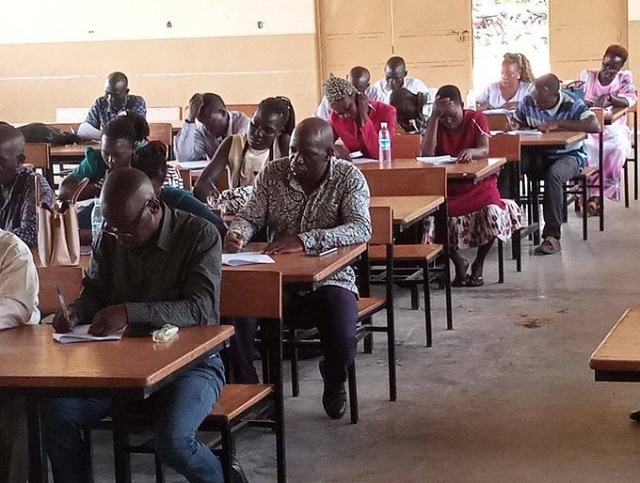
Kampala, Uganda | THE INDEPENDENT | Several education experts have questioned the approach taken by Nakaseke in addressing the poor performance of some schools in the Primary Leaving Examination (PLE). Amidst concerns over poor-performing schools, Ignatius Koomu, the Nakaseke LCV Chairperson, instigated competence tests for primary seven teachers.
Koomu, a retired teacher himself, believes that teachers who struggle with the subjects they teach might face challenges in adequately preparing students to excel in that specific area.
Forty teachers from the 15 public schools with the worst performance as per the district ranking were required to take a competency test. This test mirrored the mock exams administered to the 2023 Primary Seven class before their final exams.
“This is total madness, trivializing and politicizing the serious issue of learners’ performance,” Juma Mwamula, a senior teacher described the chairperson’s action.
Mwamula acknowledges the potential merit behind assessing teacher competency.
However, he questions the implementation approach, suggesting it might be a publicity-driven tactic or a measure undertaken due to a pressing need to address the district’s learning outcomes.
Mwamula suggests that instead of immediately attributing poor performance solely to teachers, district education officials, parents, and political leaders should have first investigated the various factors influencing learner performance.
He emphasizes that while teachers play a role, other factors also contribute to performance. Even if it were established that teachers are the issue, Mwamula argues that the competency in question should not be limited to primary seven teachers alone.
He questions why primary seven teachers are the only ones assessed when they receive learners towards the end of the education level. Mwamula points out that if teachers in lower classes were incompetent, performance in P.7 can’t be any better.
“Our society tends to focus solely on performance at the very end, in this case, through testing primary seven teachers. However, this raises questions. Are we certain that teachers in earlier grades are demonstrably better? Automatic promotion policies might also be a factor. Were students adequately prepared to reach primary seven? A comprehensive evaluation is crucial. While teacher competency is important, solely testing them at this stage might not provide the necessary solutions,” Mwamula adds.
Dr. Godfrey Bakaira, the head of the Department of Teacher Education at Kyambogo University, said that the chairperson’s actions were aimed at enhancing performance. In his view, this approach is too basic and ineffective without a comprehensive analysis of the entire system.
Dr Bakaira warns that if the chairperson persists with his method, it may lead teachers to resort to malpractice tendencies in the next Primary Leaving Examination (PLE) to achieve better results for their schools.
“Malpractice has been on the rise recently, largely due to such methods. Many parents demand results almost forcefully, and private schools have resorted to malpractice as a solution. But, have the children truly gained an education?” he notes.
Bakaira further emphasizes, “The teacher may indeed be part of the problem, as many of them are frequently absent from school, resulting in inadequate instruction for the learners. However, this does not mean that the teacher himself cannot pass the test. Even if such a teacher passes the test, will it have addressed the issue of absenteeism?”
Filbert Baguma, the General Secretary of the Uganda National Teachers Union-UNATU, characterizes the chairperson’s actions as politically motivated and unlikely to yield tangible results. He goes further to denounce the action as illegal.
Baguma highlights a concerning trend in Uganda where poor performance is often attributed solely to teachers without considering other factors within the teaching-learning process.
Baguma emphasizes that various elements, including school leadership, students, and parents, play pivotal roles. He asserts that for the district to enhance student performance, every education stakeholder must fulfil their respective responsibilities and address issues that impact performance comprehensively.
Koomu has been advocating for a competence test for teachers since 2018, expressing a strong desire for headteachers and teachers who fail such a test to be demoted or transferred. However, his plans have faced opposition over the years.
In 2018, UNATU threatened to call for a strike if the chairperson proceeded with the testing of teachers. That year, the district even allocated a budget of five million shillings to print copies of past Primary Leaving Examination (PLE) papers to be administered to the teachers.
However, the Education Service Commission and the Ministry of Education intervened, halting the exercise, citing that the chairperson was exceeding his mandate.
Reports from the district indicate that over the years, the chairperson has been using his authority to demote headteachers of schools with poor performance and transfer others. Additionally, teachers of primary seven could be reassigned to other classes.
According to a source from the district speaking to URN, “The headteachers have been demoted. To avoid legal issues, they simply demote them to classroom teachers but maintain their salaries, and appoint deputies as acting headteachers of the school. This practice may be illegal, but the chairperson holds significant power in this area.”
Despite being unpopular among teachers, educationists, and policymakers, the method in question is admired and praised within the district, including by many parents and some teachers. They believe that this approach might yield positive results.
Gordon Musinguzi, a parent from Nakaseke, expresses full support for the idea and eagerly awaits the results of the test that the teachers have undergone. He adds that if the teachers truly possess the required competence as they claim, why would they fear sitting the papers?
Ivan, not his real name, a pupil in a public school in Wakiso, expresses support for the testing of teachers. He affirms that some teachers assigned to teach are incompetent, amidst other challenges such as many not showing up for duty.
“Some teachers don’t even realize they are teaching. One time, we had a teacher and other students were saying he is giving us ‘katwa’ (poison in school slang it indicates that the teacher was teaching incorrect information to the learners),” the pupil noted.
James Tumuheru, Headteacher of Ngooma Church of Uganda Primary School, acknowledges his disagreement with the method employed and the unexpected testing of teachers. However, he strongly asserts that teachers must demonstrate competence in their subjects, and those unable to pass such tests should not be permitted to teach students.
Koomu, the district chairperson, has since defended his actions, noting that the test is necessary to determine the competence of teachers. He eagerly awaits the outcomes, believing that they will provide valuable insight into whether the teachers are truly competent. //Cue in; “Tugenda kulaba… Cue out…nga bayita bulungi.”//
Carol Kavuma, an educationist and teacher educator, advocates for the measurement of teacher competency. She believes teacher training programs should be strengthened to ensure that qualified individuals are entering the education sector.
“The reforms in teacher education are aimed at ensuring that we have better teachers. There is no doubt that the quality of teachers significantly impacts the quality of education. Therefore, good teacher training is essential for the development of quality education,” Kavuma asserts. However, she notes that the chairperson may be offering the wrong solution to the problem.
Kavuma highlights that better-performing schools prioritize teacher development, emphasizing continuous professional development through workshops, collaborative group planning, and other methods.
Over time, there have been indicators that some teachers within the education system lack the necessary competence, ultimately affecting learning outcomes.
In 2016, a report by the National Assessment of Progress in Education (NAPE), produced by UNEB, revealed a concerning discovery: 8 out of 10 teachers who had qualified in 2015 were incapable of reading or solving basic primary school mathematics questions. This issue was further exacerbated by the fact that the tutors responsible for training these teachers were also not proficient in these essential skills.
The problem of low-quality teachers was partly attributed to the Ministry’s practice of admitting students who had failed their O’level examinations into teacher training programs, rather than selecting the best-performing students.
To address this issue, admission requirements were revised to mandate credits in mathematics, English, and physical and biological sciences. However, later they completely phased out the admission of O’level graduates to train as teachers under the new teacher policy.
Furthermore, the Ministry has approved a teacher incentive framework aimed at rewarding high-performing teachers and addressing underperformance. One of the criteria for measuring performance includes students’ academic achievement. However, the implementation of this framework is pending the establishment of the Teacher Council, which will be responsible for such matters.
Additionally, the teacher policy has made it compulsory for teachers to undergo Continuous Professional Development (CPD) programs to ensure that their teaching competencies are regularly enhanced, thus maintaining high performance for better educational outcomes.
****
URN
 The Independent Uganda: You get the Truth we Pay the Price
The Independent Uganda: You get the Truth we Pay the Price



